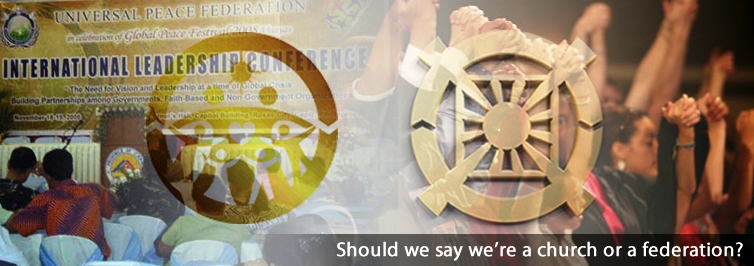![]()
The Words of the Burton Family
|
|
The Words of the Burton Family |

Two scholarly experts on new religious movements will publish an analysis of the emerging strategy of the new leaders of the Unification Church in a forthcoming issue of Nova Religio, The Journal of Alternative and Emergent Religions.
Prof. David Bromley, Professor of Religious Studies and Sociology at Virginia Commonwealth University, and Alexa Blonner, an early member of the Unification Movement and today a graduate student residing in Australia, conclude that the new leadership of the Unification Church, i.e. Rev. Hyung Jin Moon, Rev. In Jin Moon, and Mr. Kook Jin Moon have adopted a leadership strategy that solves fundamental problems that had plagued the Family Federation for World Peace and Unification (FFWPU). "[T]he new church strategy that now holds sway has addressed the problems of congregation stability, financial solvency, and leadership succession opportunities more effectively than the movement-oriented FFWPU," the authors write. Prof. Bromley and Ms. Blonner have written a paper entitled "From the Unification Church to the Unification Movement and Back," a draft of which has been provided to Familyfed.org.
The authors tell their readers that they are reporting on the transition of leadership in the Unification Movement in the context of other religious movements. "Two widely observed patterns in the development of new religious movements are a gradual settling of the movement and a transition in leadership from the movement founder/leader(s) to their successors. We report here on the confluence of these two developments in Unificationism over the last several years," they write.
They add: "Two principal changes in Unificationist organization have occurred. First, the longstanding tensions between established church and social movement forms of organization are being resolved in favor of the former. Second, Rev. Moon has begun passing organizational leadership to several of his children. Both of these processes have involved considerable turmoil, and the two developments have overlapped and interacted with one another."
"The movement-oriented FFWPU failed to address three major issues confronting Unificationism during the 1990s," according to the authors. The three issues mentioned in the paper are problems of self-understanding, finances, and the challenge of the Founders' succession.
First, the name change to "Family Federation" confused both members and religious allies in other communities. Many in the movement wondered aloud about the definition of "membership." Second, after many in the movement had settled into child-rearing, there was a problem of financing the movement-oriented projects such as the many ecumenical gatherings for clergy, peace conferences, and subsidizing The Washington Times, but without the large base of young, unmarried church activists who could provide the funding for these efforts. "Continuing the religious movement orientation largely ignored the very real organizational problems that had been building up within Unificationism. During the 1990s the economic conglomerate that Moon had developed in Korea collapsed. The centerpiece Washington Times was struggling financially and continued to constitute a major economic financial drain on Unificationism," the authors explain.
Third, there was the problem of establishing the role of Rev. Moon's children as his successors. Would they follow in his footsteps as leaders of a global, social movement or as pastors of a discreetly-defined new church? Prof. Bromley and Ms. Blonner write: "Finally, and perhaps most importantly, the new organization raised the question of what role Moon's successors would play as Unificationist leaders. They would be organizing largely symbolic events as Moon had earlier but without possessing Moon's messianic credentials, authority, or mission." They conclude that the Rev, Hyung Jin Moon and two of his siblings decided to revive the name, doctrine and values of the Unification Church, yet with substantial improvements to its ministry and approach to outreach.
Prof. Bromley and Ms. Blonner are the first scholars to report on the innovations to ministry in the United States led by the national pastor of the Unification Church, Rev. In Jin Moon. "In the United States, the new American pastor In-Jin Moon took steps to revivify American congregations. Having become CEO of the church's Manhattan Center in New York following the death of the eldest male sibling Hyo-Jin Moon, she used its facilities as the basis for a new church platform that she called 'Lovin' Life Ministries' (LLM). Modeled on the American mega-church style, a top-notch band and sermons of hope and positivity soon had members pouring into the Manhattan Center every week, particularly second-generation members.
In a major innovation, the Manhattan Center worship services were also delivered by direct satellite broadcast to congregations throughout the United States as a basis for their weekly services. LLM in New York also instituted a learning center as a new method of outreach, offering everything from 'relationship' classes to dancing classes to Unificationism-study classes. Witnessing was stepped up, but prominence was given to real-life application of Unification values and teachings rather than the philosophical and theoretical approach of the past."
During the same period, Dr. Hyun Jin Moon, the eldest surviving son of Rev. Sun Myung Moon and Dr. Hak Ja Han Moon, has continued to pursue the movement-oriented approach at "Global Peace Festivals" under the banner of "One Family Under God." The scholars write that "The experiment with the 'one family under God' movement approach lasted about a decade, but did not successfully address the problems of local church and congregation viability, the financial erosion of the movement, or meaningful leadership roles for Moon's successors."
The authors conclude: "While some divisions remain within the Moon family and schism between national groups or organizational components of Unificationism remains a possibility, particularly upon Rev. Moon's passing, Unificationism appears headed in a more settled, accommodative direction."